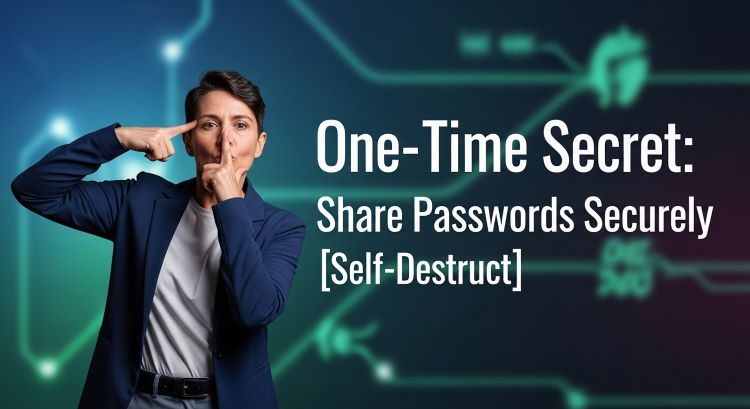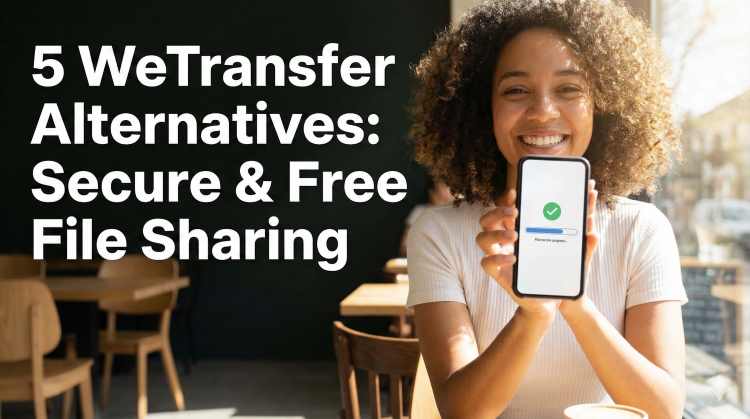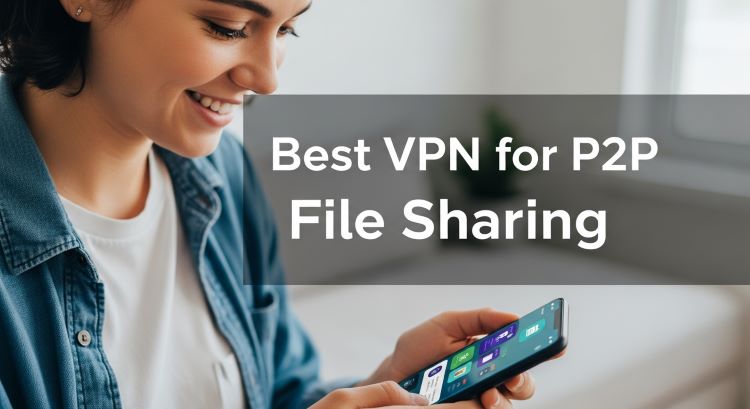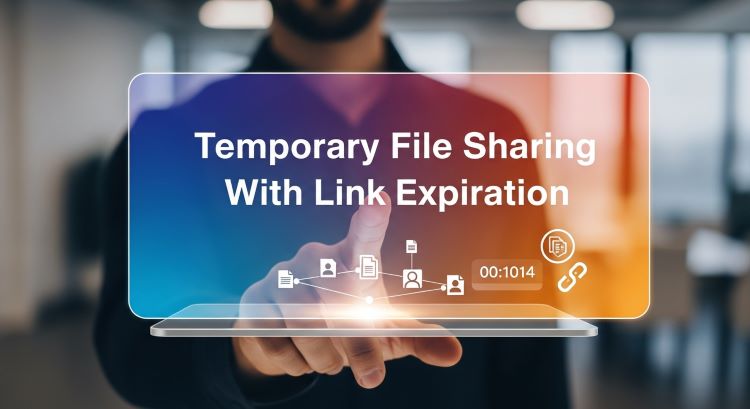One-Time Secret: Share Passwords Securely (Self-Destruct)

Remember when LastPass got hacked? It showed us that even password managers can be broken into. If you're still sharing passwords through email or text messages, you're basically leaving your front door wide open for hackers. There's a better way: one-time secrets that disappear after someone views them. Let me show you how PrivatelyShare makes this super easy.
What Is a One-Time Secret?
Think of it like a secret note that burns itself after someone reads it. You share a password once, the other person sees it, and then it's gone forever. No copies, no traces, no way for hackers to steal it later.
Why You Should Care
When you send a password through email or Slack, it stays there forever. Anyone who hacks your email can see all your old passwords. With a one-time secret, the password disappears the second someone views it. Problem solved.
How to Share a One-Time Secret on PrivatelyShare
It's easier than you think. Here's what you do:
- Go to PrivatelyShare.com
- Type or paste your password in the box
- Click the dropdown and choose "Password"
- Turn on "Delete after 1 view"
- Click "Create Secret Link"
- You'll get a 4-letter code like
7G3K - Text that code to your friend: "Go to PrivatelyShare.com and enter 7G3K"
- When they view it, the password deletes itself automatically
That's it! No account needed, no complicated setup. Just paste, share, and the secret destroys itself after one view.
Your Password Gets Encrypted Before It Even Leaves Your Computer
Here's the cool part: PrivatelyShare encrypts your password in your browser before sending it anywhere. That means:
- The password scrambles into gibberish on your computer
- Only scrambled text goes to the server (we can't read it)
- Your friend's browser unscrambles it when they view it
- After they view it once, the scrambled version gets deleted forever
Real Example: Sharing Your WiFi Password
Let's say a contractor needs your WiFi password. Instead of texting it (which saves it in your message history forever), you:
- Paste your WiFi password into PrivatelyShare
- Get a code like
9M2T - Text them: "WiFi password at PrivatelyShare.com - code 9M2T"
- They type in the code, see the password, connect to WiFi
- The password is now permanently deleted
No more worrying about old contractors still having your WiFi password saved in their texts!
Share Secrets in Person with QR Codes
When you create a one-time secret, PrivatelyShare automatically makes a QR code for you. This is perfect when you're standing next to someone:
- Create your secret like normal
- Show them the QR code on your screen
- They scan it with their phone camera
- The secret opens on their phone
- After they view it, it's deleted
No typing, no sending links through apps that save your messages. Just scan and done.
The 4-Digit Code System: Simple but Secure
Every secret you create gets a random 4-character code like 7G3K or B4R9. Here's why this is smart:
- Easy to say over the phone: "Seven, G, Three, K"
- Hard to guess: There are over 1.6 million possible codes
- No account needed: Anyone can use the code, no sign-up required
- Expires fast: After 1 view OR 24 hours, whichever comes first
Phone Call Example
Imagine you're on a phone call with a coworker who needs a database password:
You: "Go to PrivatelyShare.com and enter code Seven-G-Three-K"
Them: "Got it, I see the password now"
You: "Perfect, it just deleted itself"
Even if someone was listening to your call, the code is useless now because the password already disappeared.
Direct Transfer: Zero Storage on Any Server
Want even more privacy? Use PrivatelyShare's Direct Transfer feature. This sends your password straight from your computer to theirs—it never touches our servers at all.
How It Works
- Click "Direct Transfer" on PrivatelyShare
- Type your password or upload a file
- Share the special link with your friend
- When they click the link, your computers connect directly to each other
- The password transfers straight from you to them (no middleman)
- Nothing gets stored anywhere
When Should You Use This?
- Sharing super sensitive stuff like SSH keys or root passwords
- When you don't want ANY server involved (not even ours)
- Sending large files along with passwords
- Maximum privacy mode
"Delete After 1 View" vs "Delete After 24 Hours"
Most secret-sharing sites say "this link expires in 24 hours." That's okay, but PrivatelyShare does something better: "delete after 1 view."
| 24-Hour Expiry | 1-View Expiry (PrivatelyShare) |
|---|---|
| Link works for a whole day | Link works for one view only |
| Can be opened many times in 24 hours | Opens once, then dies immediately |
| Vulnerable for 24 hours | Vulnerable for 30 seconds (until they view it) |
| You have to wait for time to pass | Deletes the instant they see it |
You can set both on PrivatelyShare: "Delete after 1 view OR 24 hours, whichever happens first." That way if they never view it, it still disappears.
Share Files That Can Only Be Downloaded Once
You can also share files with the same one-time protection. Perfect for sending things like:
- Encrypted password manager backups
- Private SSH keys
- Confidential documents
- Software licenses
Here's How:
- Go to Secure File Sharing
- Upload your file (up to 100MB)
- Turn on encryption
- Set "Delete after 1 download"
- Share the 4-digit code
- After they download it once, the file is permanently deleted
PrivatelyShare vs Everything Else
| Feature | PrivatelyShare | Slack/Discord | |
|---|---|---|---|
| Deletes after 1 view | ✅ Yes | ❌ No | ❌ No |
| Encrypts before leaving your device | ✅ Yes | ❌ No | ⚠️ Sometimes |
| No account required | ✅ Yes | ❌ No | ❌ No |
| QR codes | ✅ Yes | ❌ No | ❌ No |
| Direct device-to-device transfer | ✅ Yes | ❌ No | ❌ No |
| Saves message history | ✅ No (deletes instantly) | ❌ Yes (forever) | ❌ Yes (forever) |
Your First One-Time Secret: Complete Walkthrough
Let's walk through a real scenario step-by-step:
Scenario: Your Friend Needs Your Netflix Password
Step 1: Open PrivatelyShare.com on your phone or computer
Step 2: You'll see a big text box. Type your Netflix password in it
Step 3: Below the box, click the dropdown that says "Plain Text" and change it to "Password"
Step 4: Look for "Expiry Type" and change it to "Delete after viewing"
Step 5: Set "Max views" to 1
Step 6: Click the big "Create Secure Link" button
Step 7: You'll see a code like 7G3K. Copy it.
Step 8: Text your friend: "Netflix password is on PrivatelyShare.com - code is 7G3K"
Step 9: They go to the site, type in 7G3K, and see your password
Step 10: The password is now permanently deleted from PrivatelyShare's servers
Done! Your friend has the password, but there's no record of it anywhere. Not in your texts, not in emails, not on any server.
Why This Matters for You
Think about how many times you've shared passwords this week. Maybe you:
- Texted your WiFi password to a guest
- Emailed a coworker a shared account login
- Slacked someone an API key
- Sent a family member your streaming service password
Every single one of those passwords is still sitting in a message history somewhere. If someone hacks your email, Slack, or phone, they get ALL of those passwords.
With PrivatelyShare, those passwords would already be gone. Viewed once, deleted forever.
Ready to Try It?
You don't need to create an account. You don't need to download anything. You don't even need to give us your email.
Just:
- Go to PrivatelyShare.com
- Paste a password
- Get a 4-digit code
- Share it
The next time someone asks for a password, don't text it to them. Create a one-time secret instead. It takes 30 seconds and it's way more secure.


